IBO Fall 2017 Patent Litigation Review: PacBio v. Oxford Nanopore Cases Multiply
IBO’s biannual review of US patent litigation involving analytical instrument and lab product companies finds further activity on the NGS front, including more settlements (see IBO 5/15/17). In addition, Eppendorf wins damages, and Thermo Fisher takes on Agilent Technologies.
New Cases
Pacific Biosciences (PacBio) filed a second US patent suit (see IBO 5/15/17) in the US District Court of Delaware in September against UK-based Oxford Nanopore alleging infringement of two patents by all of Oxford Nanopore’s nanopore sequencing products (see table). Oxford Nanopore has not yet filed a response.
In addition to this latest case, PacBio has cases pending against the company before the US International Trade Commission (ITC) claiming infringement of two patents, including US Patent No. 9,542,527 (Compositions and Methods for Nucleic Acid Sequencing), which was added to the complaint file earlier this year in March.
This summer, an administrative law judge ruled that the terms “single-molecule sequencing process” and “single-molecule sequencing” as used in the patents were limited, and subsequently granted Oxford Nanopore’s motion for summary determination. The ITC has since granted PacBio’s request for a review of both rulings.
Overseas, PacBio has two patent cases pending against Oxford Nanopore. Filed in February in the High Court of England and Wales, one suit is focused on the same patents as the ITC case. A similar claim was filed in Germany in April. But Oxford Nanopore has fired back. In April, the company and patent holder Harvard University brought suit against PacBio in the High Court of England and Wales charging infringement of European Patent (UK) No. 1,192,453 (Molecular and Atomic Scale Evaluation of Biopolymers).
NGS technology is at the center of another suit, this one involving former legal foes. Following dismissal of a suit involving the same parties but different patents (see below), Columbia University and QIAGEN have filed another suit against Illumina (see table). This suit regards a patent related to sequencing by synthesis, specifically nucleotide analogues, issued in July. QIAGEN is the exclusive licensee. The complaint alleges infringement by Illumina’s NGS systems and kits. Three additional patents, issued the same month, were added to the suit in August. The plaintiffs are requesting royalties and a permanent injunction. In an answer to the complaint filed last month by Illumina, the company denied the allegations.
In July, Bio-Rad Laboratories and Lawrence Livermore National Security (LLNS) filed suit against 10x Genomics in the US District Court for the Northern District of California (see table). The suit charges infringement of seven patents, five of which are owned by Bio-Rad, and two of which are co-owned by Bio-Rad and LLNS with Bio-Rad as the exclusive licensee.
The complaint alleges infringement of patents, which are employed in Bio-Rad’s ddPCR (Droplet Digital) systems, by 10x’s GemCode and Chromium systems. 10x was established by former Bio-Rad employees. According to the complaint, “On information and belief, the GemCode and Chromium products both utilized the same scientific principles to create emulsions in a microfluidics chip, and use the same type of microfluidic chips, both of which infringe the claims of the asserted patents.” Among the plaintiffs’ requests are injunction relief, compensation and damages. In September, 10x filed an answer denying the allegations and counterclaiming for declaratory judgment. Bio-Rad and LLNS commenced an ITC complaint against 10x in August (see IBO 8/31/17) regarding five of the patents.
Earlier this year, Bio-Rad acquired RainDance Technologies (see IBO 1/31/17), which along with the University of Chicago, has a 2015 suit pending against 10x Genomics (see IBO 4/30/15).
In a case involving competitors in the ICP-MS market, Thermo Fisher Scientific filed suit against Agilent Technologies in May, alleging infringement of three patents by Agilent’s 8800 and 8900 ICP-QQQ (see table). According to the complaint, Thermo Fisher first notified Agilent of the alleged infringement in 2012, which Agilent denied. Two of the patents were reissued (a patent is reissued to correct an error in the original patent) in 2015. Last month, Agilent filed a motion to dismiss for failure to state a claim.
Judgment
Eppendorf announced that in July the US District Court issued a final default judgment in Eppendorf’s 2015 suit against Topscien Instrument (Ningbo China). The judgment permanently enjoins Topscien from using Eppendorf’s MiniSpin centrifuge trademark or product design trade dress (visual product appearance) in the US. Eppendorf was also awarded liquidated damages.
In September, Eppendorf was also awarded two separate judgments of the Landgericht Duesseldorf in its suit against Ritter for infringement of European Patent Nos. 2575402B1 and 2279791B1 by Ritter’s Ritips pro and Ritips professional dispenser tips. Ritter recently dropped its appeals. Ritter is permanently enjoined from using Eppendorf’s patents in Germany, and Eppendorf was awarded damages. Eppendorf stated, “While Eppendorf has an active licensing program for much of its intellectual property, Eppendorf is not willing to tolerate infringement of its patents or unauthorized use of its registered trademarks or its product trade dress (designs).”
Settlements
As noted above, plaintiffs QIAGEN and Columbia University, and Illumina have settled two NGS cases. The US District Court dismissed the 2013 case which was originally brought against Intelligent Biosystems’ (IBS) (now QIAGEN). The court’s order cited a settlement between the parties. Columbia and IBS’ claims were dismissed with prejudice (the case cannot be brought again on the same claims) and its counterclaims were dismissed without prejudice, while Illumina’s counterclaims were dismissed without prejudice. The settlement comes after a 2014 decision, upheld in 2015, by the USPTO that found the plaintiffs’ patents invalid.
In a related case that resulted in an injunction barring sale of QIAGEN’s original NGS system in the US (see IBO 9/15/16), in July, the District Court dismissed Illumina’s 2016 patent infringement suit against QIAGEN following the parties’ request. However, the court wrote, “Except as otherwise permitted by the parties’ settlement agreement, Defendants and their officers, affiliates, and employees, agree not to use, offer to sell, or sell within the United States, or import into the United States, any products or systems that comprise a nucleotide or nucleoside molecule, wherein the nucleotide or nucleoside molecule has a ribose or deoxyribose sugar moiety with an azido-containing protecting group attached via the 2′ or 3′ oxygen atom of the ribose or deoxyribose sugar moiety. This includes the azido-protecting group chemistry sold by QIAGEN in 2016 in connection with its GeneReader product. Nor shall they infringe, contribute to the infringement, or induce infringement of any Patent Claims.”
454 Life Sciences’ (now Roche) 2015 suit against Ion Torrent, Life Technologies and Thermo Fisher Scientific has also been dismissed. The case centered on emulsion PCR. The suit involved three patents: US Patent Nos. 7,323,305 (Methods of Amplifying and Sequencing Nucleic Acids), 8,748,102 and 8,765,380 (both for Bead Emulsion Nucleic Acid Amplification). Earlier this year, the USPTO terminated an inter partes review of the three patents due to notice of a settlement agreement. The case was closed in April following the parties’ stipulation to dismissal with prejudice of 454’s claims, and dismissal without prejudice of Thermo Fisher’s counterclaims.
Another suit involving Thermo Fisher was also settled earlier this year. The 2016 suit, brought by Bio-Rad Laboratories and involving US Patent No. 8,236,504 (Systems and Methods for Fluorescence Detection with a Movable Detection Module), was dismissed by a US District Court.
In the conclusion of a six-year case, in August, the US District Court granted the parties’ motion to dismiss without prejudice Scientific Plastic Products’ (SPP) 2011 patent infringement suit against Biotage and Merck & Co. (see IBO 4/30/12). Both patents were subjects of US Patent and Trademark Office (PTO) inter partes re-examinations. Earlier this year, the PTO upheld its ruling invalidating SPP’s patents. In a press release, Biotage stated, “Defendants have not agreed to any liability and no claim remains pending against Defendants.” Settlement terms were confidential.
Also in August, Omni Medsci’s case against Leica Microsystems (see IBO 5/15/17) was closed after the court agreed to the parties’ stipulation for dismissal. All claims were dismissed with prejudice.



